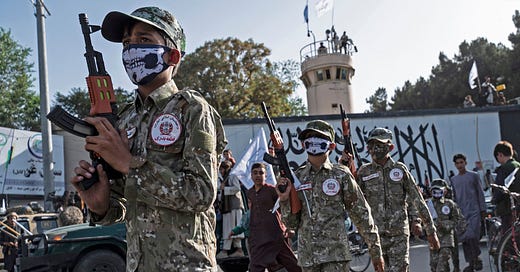
IN LATE 2013, I HEARD A MARINE MAJOR GENERAL who had just returned from Afghanistan tell an auditorium full of American diplomats and national security experts, “We have strategically defeated the Taliban in Helmand province.”
I nearly fell out of my chair. I, too, had recently returned from Afghanistan. During my year-long deployment, we often visited Helmand from my base in northwest Kandahar. It was never a peaceful journey.
For the next hour, the major general’s team put on a dazzling display of PowerPoint slides with all the graphs and charts military officers love. At the end of the briefing, they had convinced many in the crowd that the tide had turned.
That was my first real taste of American hubris—something that I would become guilty of as well.
When I returned to Afghanistan in 2014, Helmand was on fire and the Marines were ordered back in to strategically defeat the Taliban—again. There was also a new group making trouble in northeastern Afghanistan—the Islamic State of Khorasan Province (ISK).
When my boss asked me about ISK, I was smug. “I don’t think ISK will find a secure footing in Afghanistan,” I told him. “They won’t last.”
Nearly a decade later, ISK is alive and thriving. It is strong enough to mount attacks as far away as Moscow. On the same day as the attack on Moscow’s Crocus City Hall, ISK conducted a successful suicide bombing in Kandahar, the Taliban’s spiritual heartland. Earlier this year, they killed nearly a hundred people at a ceremony for Qassem Soleimani, the late Islamic Revolutionary Guard Commander.
What gives?
My misjudgment about ISK, like the Marine major general’s misjudgment about the Taliban in Helmland, reflect a problem that affects not only our intelligence analysis but our broader strategic thinking. America has a strategic narcissism problem. We project our values, desires, and priorities onto our enemies and adversaries (not to mention our allies and partners) without understanding that they have agency, too. We keep declaring victory, even though our enemies have not relented.
FOR THE PAST TWENTY YEARS, the United States has repeatedly proclaimed victory over terrorist groups, only to be surprised at their resilience. We declare the group defeated, only to be surprised when they “spring up” again.
Premature congratulations are a bipartisan problem. In 2005, Secretary of Defense Donald Rumsfeld attempted to suppress the word “insurgency.” The following year, Vice President Dick Cheney insisted that the Iraqi insurgency (he apparently hadn’t gotten Rumsfeld’s memo) was waning. President Obama declared Iraq an “extraordinary achievement” in 2011 and withdrew American forces. Five years later, he dismissed the newly found Islamic State as the “jayvee team,” only to send back American forces to quell its march toward Baghdad. In 2019, President Donald Trump boasted of the killing of Abu Bakr al-Baghdadi, only to sign a surrender agreement with the Taliban the following year, ensuring the Islamic State’s survival in Afghanistan. President Joe Biden’s national security advisor, Jake Sullivan, boasted that the Middle East was “quieter today than it had been in two decades” eight days before Hamas sent the region into crisis.
Our rhetoric does not match reality. We are still fighting a low-intensity war against Islamist extremists from West Africa to South Asia. We still have troops in Iraq and Syria helping indigenous forces fight remnants of the Islamic State. Our troops are arrayed from Niger to Kenya to Kuwait to fight Islamist terrorism, and from Djibouti to Bahrain to help deter Iranian aggression and support our partners.
Currently, the terrorists have the momentum. We should stop pretending otherwise. While the various terrorist groups differ in ideology, geographic scope, ethnic makeup, goals, and styles, they have a pretty good collective record. Over the last three years, they have defeated the United States and NATO, contested Israeli sovereignty, and pierced the security services of both Iran and Russia.
A big part of the problem is that we equate battlefield successes with outright victories. Just because a terrorist group is no longer on the battlefield doesn’t mean it’s no longer active. Al Qaeda and the Islamic State are not “back”—they never went away.
None of this should surprise us. Terrorist groups thrive in lawless regions—and there are plenty of those. The Taliban does not have complete control over Afghanistan, and ISK is taking advantage. Pakistan recently conducted airstrikes against the Afghan Taliban for harboring the Pakistani Taliban. While anti-Taliban Afghan resistance groups are not strong enough to challenge Taliban rule, they are still conducting harassing attacks throughout the country. The Taliban simply cannot be a successful counterterrorism partner, even if they wanted to—which they don’t. So Afghanistan will likely remain terrorist breeding ground as it was before 9/11.
This problem is not confined to the Middle East and South Asia. These groups are expanding in Africa, too.
After the French withdrew from Mali in 2022, the Islamic State began making serious inroads into the impoverished nation. Both the Islamic State and al Qaeda-linked groups are expanding their tentacles into West Africa. And with the possible expulsion of American troops from Niger, the United States is in danger of losing its lone base for counterterrorism operations in that region.
THESE GROUPS ARE NOT ONLY a threat to our allies and interests overseas but also to the homeland. Both al Qaeda and the Islamic State want to conduct attacks on the United States. According to Army Gen. Michael Kurrila, the commander of Central Command, the Islamic State could conduct attacks against the United States or its interests “in under six months with little to no warning.” Relatedly, the Taliban’s supreme leader, Hibatullah Akhunzada, to whom al Qaeda has pledged loyalty, recently declared himself “God’s representative on earth,” which is the exact language that the Taliban’s founder, Mullah Omar, used to rally the faithful.
“Akhunzada combines bin Laden’s intellectual acumen and Zawahiri’s ideological makeup in one. And that’s very scary,” terrorism expert Sara Harmouch told The Bulwark.
It may seem like forever ago, but ISIS has inspired terrorist attacks in the United States. The first ISIS-inspired attack in the United States was in 2014, when a radicalized man attacked police officers with a hatchet. ISIS claimed responsibility (probably through inspiration rather than active involvement) for an unsuccessful 2015 attack in Garland, Texas, and inspired the San Bernardino shooting later that year in which fourteen people were murdered and twenty-four were injured. The Islamic State also claimed responsibility for the June 2016 Pulse nightclub shooting, the November 2016 attack at Ohio State University, the October 2017 attack in which a man mowed over eight people in New York City with a rented truck, and the December 2017 attempted pipe bomb attack at the Port Authority Bus Terminal in New York.
They’ve killed Americans on American soil, and they want to do so again. The same goes for al Qaeda. And they are likely to inspire lone-wolf attacks soon. In fact, just this week the FBI arrested an 18-year-old man in Idaho for plotting to kill churchgoers in his town in the name of the Islamic State.
SO WHAT SHOULD BE DONE? First, we must come to terms with an uncomfortable fact: Our war against Islamist terrorism will persist throughout our lifetimes. It is a wickedly complex problem with no easy solutions.
Second, we need to change the way we frame the war so we can properly evaluate it. The “Global War on Terror” was probably a more responsible name than many Americans would have chosen in the days after 9/11—George W. Bush wisely went out of his way to emphasize that it was not a war against Islam—but today the name obscures more than it illuminates. We should likewise cease calling it the “war on terrorism” or worse, the “forever war.” We should instead consider simply calling it the Long War. This name acknowledges the length of effort without being self-defeating, doesn’t claim to be fighting a tactic, and doesn’t invite smears that the United States is at war with all Muslims.
We must also be flexible in our approaches. What works in Africa may not be replicable in the Middle East or South Asia. The legendary Sons of Iraq program wasn’t replicable in Afghanistan. Every region is different and has its own unique culture, politics, religion, and history. Fighting the long war will require all the tools: law enforcement, intelligence, sanctions, and soft power. But most of all, it will require patience, persistence, and resilience.
We should also recognize that we will have to partner with imperfect allies. For every reliable partner, like the Kurds, we will have to partner with groups with shoddy human rights records to defeat a more dangerous, imminent threat. Unfortunately, we don’t get to create our allies in our own image—at least, not immediately. We get who is available in the area.
We will also have to contend with our Afghanistan legacy. Would-be partners watched us abandon our Afghan allies and then blame them for our defeat, even though we retreated from the battlefield first. It will take time and persistence to rebuild our reputation.
Lastly, having an effective counterterrorism strategy does not mean prioritizing Islamist terrorism over Russia or China. Our near-peer competitors should take precedence. But while these two adversaries are existential threats, Sunni and Shia Islamic terrorists are the ones who keep attacking and killing Americans.
The truth is that the “forever wars” never ended. We may wish they would, but retreating from the world and putting our heads in the sand is ineffective. Admitting we have a terrorism problem is step one. And until we do, we will remain a vulnerable target.





